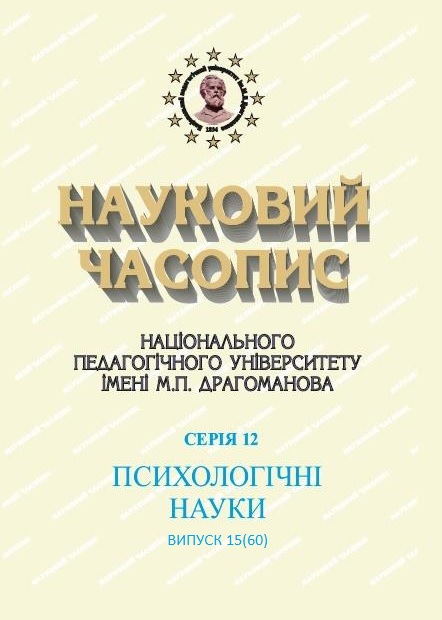THE DIAGNOSTICS OF THE FUTURE PRESCHOOL TEACHERS’ LEVEL OF PROFESSIONAL CULTURE FORMATION
DOI:
https://doi.org/10.31392/NPU-nc.series12.2021.15(60).02Keywords:
professional culture, pedagogical culture, formation, diagnostics, components of the professional culture, levels, future educators of preschool institutions.Abstract
The article is devoted to the study of the future preschool teachers’ professional culture during the process of their professional training in the higher pedagogical education establishments. Theoretical analysis of psychological and pedagogical literature on the research problem has been carried out, the essence of the concept “the future preschool teachers’ professional culture” has been revealed. The own interpritation of the concept “the future preschool teachers’ professional culture” has been offered, namely: the future preschool teachers’ professional culture – is the presence of the teacher's spiritual wealth (high moral values), a strong creative personality, ready and capable of innovation and transformation; special personal qualities (humanism, love for children, pedagogical optimism, tolerance, tact, etc.); competencies of pedagogical activity in the field of preschool education; external aesthetic appeal.The main criteria for the formation of professional culture (spiritual-creative, cognitive, motivational-value, reflexive-perceptual, operational) have been determined. The future teachers’ levels of the professional culture formation are described, namely: initial, adaptive, reproductive-prognostic, searching-creative. The selection of diagnostic methods according to all criteria has been carried out. The author’s diagnostic technique “The future preschool teachers’ professional competence” has been developed. A diagnostic study of the level of the professional culture formation of the students of speciality “Preschool education” the faculty of Pedagogy and Psychology in National Pedagogical Dragomanov University students’ has been undertaken. The study used theoretical methods – analysis, generalization, systematization, comparison; empirical methods – observation, questionnaire, conversation; as well as diagnostic techniques aimed at identifying the level of formation of professional culture of future educators of preschool education. The analysis of the results of diagnostic research has been carried out. The insufficient level of the future preschool teachers’ professional culture formation has been revealed, especially according to spiritual-creative and reflexive-perceptual criteria. The prospects for the future research, which are to develop and implement in the educational process of the higher pedagogical education establishments the technology of the future preschool teachers’ professional culture formation, have been outlined.
References
- Belousova, T.F. (1989). Pedahohycheskaia praktyka kak faktor formyrovanyia osnov pedahohycheskoi kulturы [Pedagogical practice as a factor in the formation of the foundations of pedagogical culture]. Extended of Candidate’s thesis. Rostov-na-Donu [in Russian].
- Halchenko, V.M., & Semencha, L.H. (2020). Profesiina kultura yak systemoutvoriuvalnyi faktor uspishnosti maibutnikh pedahohiv u profesiinii diialnosti [Professional culture as a system-forming factor of success of future teachers in professional activity]. The XXI century education: realities, challenges, development trends (Monograph). In prof. Hanna Tsvietkova (Ed). (c.509–522) Hameln: InterGING. [in Ukrainian].
- Halchenko, V.M. (2019). Tvorcha indyvidualnist yak osnova profesiinoi kultury maibutnikh vykhovateliv zakladiv doshkilnoi osvity [Creative individuality as a basis of professional culture of future educators of preschool educational institutions]. Professional development of a teacher in the light of European integration processes. In prof. Hanna Tsvietkova (Ed). (c. 531–549). Hameln : InterGING. [in Ukrainian].
- Holovyna, E.S. (2005). Pedahohycheskoe sodeistvye formyrovanyiu professyonalnoi kulturы budushchykh sotsyalnskh pedahohov v vuze [Pedagogical assistance in the formation of the professional culture of future social teachers at the university]. Extended abstract of Candidate’s thesis. [in Russian]
- Ziaziun, I.A., & Sahach, H.M. (1997). Krasa pedahohichnoi dii [The beauty of pedagogical action]. Kyiv : APN Ukrainy [in Ukrainian].
- Ysaev, Y.F. (2004). Professyonalno-pedahohycheskaia kultura prepodavatelia. [Professional and pedagogical culture of the teacher]. Moscow : Akademyia [in Russian].
- Pavelko, N.Y. (2004). Kulturolohycheskaia paradyhma teoryy professyonalno-pedahohycheskoi kultury prepodavatelia vysshei shkoly [The culturological paradigm of the theory of professional and pedagogical culture of a higher school teacher]. Doctor’s thesis. Krasnodar [in Russian].
- Radul, V.V., Kravtsov, V.O., & Mykhailichenko, M.V. (2007). Osnovy profesiinoho stanovlennia osobystosti suchasnoho vchytelia: Navchalnyi posibnyk [Fundamentals of professional development of the modern teacher].Kirovohrad :«Imeks-LTD» [in Ukrainian].
- Birkeland, Å., & Ødemotland, S. (2018). Disorienting Dilemmas – the Significance of Resistance and Disturbance in an Intercultural Program within Kindergarten Teacher Integr. psych. Behave, 52, 377–387. doi: https://doi.org/10.1007/s12124-018-9433-y
- Jokikokko, K. (2016). Reframing Teachers’ intercultural learning as an emotional process. Intercultural Education, 27(3). doi: https: //doi. org/ 1080/14675986.2016.1150648.
- Weston, K., Ott, M., & Rodger, S. (2018). Handbook of School-Based Mental Health Promotion. Cham : Springer.
- Moreno, V.M. (2020). The Ideal Teacher Different Images. Hu Arenas. DOI : https://doi.org/10.1007/s42087-020-00148-0

